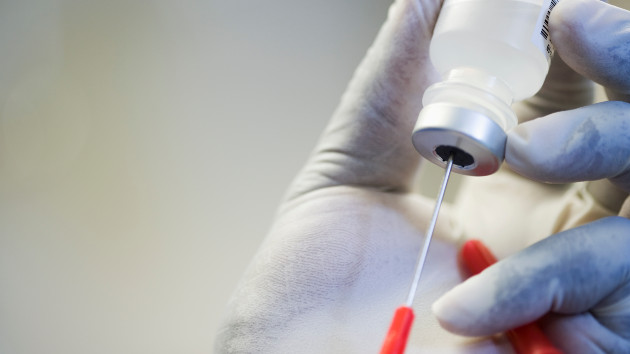(NEW YORK) — A respiratory syncytial virus, or RSV, vaccine for older adults could be on the horizon after Pfizer announced Wednesday the U.S. Food and Drug Administration would fast-track review of its experimental vaccine.
The federal health agency will make a decision by May 2023 and, if it decides to approve, it will be the first vaccine available in the country to protect against the virus that has swept the country.
“This is huge,” Dr. Gregory Poland, head of the Mayo Clinic’s vaccine research group, told ABC News. “This will be a turning point because of the burden of disease. No one needs to die or be hospitalized for this disease, again, if they take the vaccine and if they have a healthy enough immune system to respond.”
Here is everything we know about the vaccine and the review process:
How does RSV affect older adults?
Although RSV is known as a children’s disease, this is not the case, and the virus can affect adults too.
According to the Centers for Disease Control and Prevention, older adults aged 65 and above are at high risk for severe infection, particularly those with chronic lung or heart conditions and weakened immune systems.
“Older adults are at greater risk than young adults for serious complications from RSV because our immune systems weaken when we are older,” the CDC website states.
Data from the agency shows senior citizens are being hospitalized with the virus at this point in the season at a rate much higher than seen in seasons past.
As of the week ending Nov. 26, the latest date for which data is available, adults aged 65 and older are being hospitalized at a weekly rate of 2.7 per 100,000.
Although the raw number might seem small, it is much higher than usually seen at this time of year. CDC data going back to the 2014-15 season shows the rate has never been higher than 1.0 per 100,000 in early November.
What’s more, an estimated 60,000 to 120,000 older adults are hospitalized every year and between 6,000 and 10,000 die.
Why has there not been a vaccine before?
This is not the first time researchers have attempted to develop an RSV vaccine.
In the late 1960s, a vaccine was produced in which the virus was inactivated with formalin, a chemical that kills viruses. The shot was given to children in Washington, D.C., but 80% of those immunized became sick and two children died.
Studies found that the vaccine did not generate enough antibodies to fight off the virus and instead triggered an overactive immune system response.
“That stymied vaccine development for 50, 60 years in this field,” Poland said.
How does the vaccine work?
In 2013, researchers at the National Institutes of Health studied a protein from the virus called the F protein, which attaches to human cells and infects people.
They found a way to freeze the protein in the form it takes before it’s ready to attach to cells, known as prefusion form.
The Pfizer vaccine contains this prefusion form of the protein. It also is bivalent, meaning it helps protect against both the A and B strains, which are the two most common strains of the virus.
How effective is the vaccine?
Pfizer ran a phase III clinical trial testing its vaccine in adults aged 60 and older against a placebo.
In late August, the company announced that its vaccine was 66.7% effective in preventing lower respiratory tract illness and 85.7% effective at preventing severe disease.
Additionally, Pfizer said there were no safety concerns and that the vaccine was “well tolerated” among participants.
“This is outstanding,” Poland said. “We have literally gone from a vaccine that harmed people inadvertently, a shutdown in RSV vaccine research to now a phase III large global trial that showed this vaccine has excellent efficacy and preventing lower respiratory tract disease.”
What is next?
Pfizer has submitted what is known as a Biologics License Application, which is tens of thousands of pages long.
The FDA will internally review and analyze the data and make a decision on whether the vaccine is potentially ready to be marketed, Poland explained.
If the FDA decides it is ready to be marketed, it will call a meeting of its independent advisory panel, the Vaccines and Related Biological Products Advisory Committee.
During this meeting, the company will present its data, the FDA will present its analysis, there will be public commentary and the committee will discuss several questions about the vaccine including whether this is the right age group and if the vaccine is safe and efficacious.
If the committee votes to recommend authorization, the FDA will either agree with the advisory panel and authorize the vaccine or not, which should occur by May 2023.
Following this, the final step will be a similar meeting among the CDC’s advisory committee and the CDC deciding to follow or go against the recommendation.
If the vaccine is approved, it will likely be available by fall 2023.
Copyright © 2022, ABC Audio. All rights reserved.












